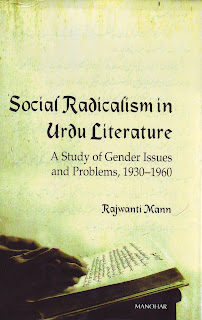Book Review
By
Amar Nath Wadehra
Social radicalism in Urdu literature by Rajwanti Mann
Manohar. Pages: 253. Price: Rs. 750/-
Societies all over the world experience periods of progress, regress and rejuvenation during the course of their evolution. Often, a society’s decline is manifested through its crumbling social, economic and political institutions. Stagnation in thought processes and the rise of conservative, fundamentalist and other retrogressive impulses, which only add to the process of degeneration, become markedly obvious in a myriad ways. Something of this sort had begun to happen in India during the eighteenth and nineteenth centuries. Traditional institutions were rotting while superstition, social injustice and oppression of women were at their zenith. It is during such times that literature’s role becomes vital because literature endeavors to reflect truth in different ways and assists in a better understanding of the society.
However, much before litterateurs took up the reformist cause, social reformers had started making their presence felt. For example, Raja Ram Mohun Roy, (22 May 1772 – 27 September 1833) a religious, social, and educational reformer challenged traditional Hindu culture and even came up with a broad outline for the progress of Indian society under the British rule. Gradually, India’s thinking classes – writers, poets, et al – too started focusing on various social ills. This led to the birth of Progressive Writers’ Association that eventually triggered off literary radicalism in the pre-Independence India. Fiction and essays of the likes of Rashid Jahan, Sajjad Zaheer, Ismat Chughtai, Saadat Hasan Manto etc played a significant role in bringing about social reforms through debates on such issues as Marxism, nationalism and feminism. In fact, in India, the progressive trend started in 1932, when the young writers like Sajjad Zaheer, Rashid Jahan, Ahmad Ali and Mehmuduzzafar came up with an anthology titled Angare that reflected the writers’ dissatisfaction with the prevailing social-political-economic conditions and the inability of Urdu litterateurs to come up with new ideas. By the standards of those times Angare was a game changer that created templates for radical thinking and writing. The anthology showed contempt for anachronistic religious and traditional attitudes that resulted in the oppression of women. This single event eventually led to the formation of Progressive Writers Association (PWA) in 1936 in Lucknow. The PWA influenced poets and writers alike and resulted in the Urdu literature becoming a noteworthy voice of social reform. However, it needs to be pointed out that much before the PWA came into being and the western thought influenced our worldview there were stirrings of progressive consciousness in the Urdu world.
Although Urdu literature remained seeped in the saki and maikhana narratives for a very long time, poets like Ghalib and Hali broke away from the tradition and enunciated progressive ideas vis-à-vis the social status of Indian women, among other issues. Nevertheless, the general notion about Urdu literature being a language of flamboyant metaphors and profligate culture, however erroneous, endures to this day.
In this tome Mann points out how progressive writers came together during the British Raj days and stirred up a largely inert literary scene through nonconformist/unconformable works. A whole gamut of issues – from socio-economic equality to female sexuality – was investigated and explored and expounded. Writers like Manto and Chugtai, and several others, broke social-literary taboos to highlight hypocrisies pock-marking the Indian society. Religious dogmas and social practices as well as familial imperatives that facilitate subjugation of women, among other oppressions, were challenged and debunked. Quite a significant section of Urdu writers focused on emancipation and empowerment of women.
The spread of new and radical ideas at the beginning of the twentieth century led to regeneration of Indian society by introducing several western and Marxist concepts and practices. Though this is a topic for a separate dissertation, suffice to say that themes like gender equality, liberalism and social equality came to India from the West had positive impact upon the worldview of Indian thinkers and writers as evidenced by the setting up of institutions like the PWA and Indian People’s theatre Association. Although this book focuses on Urdu literature it must be pointed out that literary radicalism in India was confined neither to a single language nor to a single religion or gender. Bengali and Marathi as well as Tamil literatures too had their share of radicals. If India’s social stratification has been mind bogglingly complex then its various reform oriented literary and social movements too have been multilayered, multipronged and sophisticated.
However, coming back to this tome, Rajwanti Mann has taken great pains to research and systematically present the contribution made by Urdu literature towards introducing progressive impulses into the Indian society at a time when aridity, inertness and ennui had shackled all thought processes, and hence social progress, not just in the Indian Muslim society but throughout the subcontinent. This book is a must read for all.




No comments:
Post a Comment